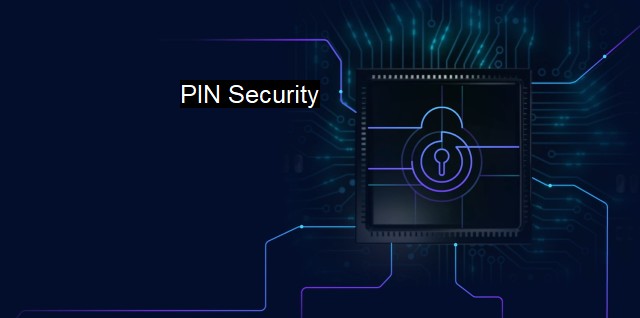What is PIN Security?
Safeguarding Sensitive Information: The Importance of PIN Security in Cybersecurity and Antivirus
PIN security is a vital element in the realm of cybersecurity and antivirus. "PIN" stands for Personal Identification Number, which acts as a secure key to protect sensitive personal and financial information across a multitude of platforms. A robust PIN brings a significant security measure to loyal users by protecting information from potential threats or cyber-attacks.In the most common scenario, a "PIN" is associate with ATMs or digital banking operations. it has extended its application, thereby contributing as one of the essential credentials needed when encrypting or decrypting crucial information during data transfers.
To understand the relevance of PIN security accurately, it's necessary to delve into the security risks associated with weak or easily guessable PINs. In today's extraordinarily digital sphere, cybercriminals are becoming more sophistical with their attack methods. Identity theft, data hacking, phishing have become prevalent. Also, with the advancements in technology, the tools employed by these criminals are evolving, enabling them unforeseen access to personal information.
If a PIN is not secure enough, it may lay the groundwork for these cybercriminals to intrude into the privacy of individuals or organizations, leading to major data breaches, financial theft, or loss of confidentiality. Therefore, robust PIN security serves as one of the most potent defenses against these threats.
Further, the role of PIN security stretches even further when considering antivirus software. Both PIN security and antivirus software aim to protect critical data– the former focuses on prevention and enhancing system thresholds, while the latter detects, prevents, and takes action against software viruses.
The antivirus scanner analyses and scrutinizes different areas of the system like memory, files, and directories, to look for potential vulnerabilities and threats. Meanwhile, if proper PIN security measures are in place, it can potentially add to the effectiveness of antivirus software. A robust PIN keeps unauthorized users out of the system, making it more difficult for viruses and other forms of malware to infiltrate.
Even with advanced antivirus software, not taking appropriate measures towards enhancing PIN security could lead to serious implications. Assuming that the antivirus software might mitigate all forms of threat while recklessly handling sensitive credentials such as PINs, could lead to detrimental outcomes. Intruders are often on the lookout for any least opportunity to strike.
PIN security extends beyond personal devices and personal information. It plays a significant role in the extensive realm of cybersecurity that involves maintaining the integrity and confidentiality of a wide range of digital infrastructures, including system applications, cloud computing systems, and, internet of things (IoT) devices.
By instigating multifactor authentication, including biometric verification, token systems, and PINs, cybersecurity enhances its shield against potential cyber threats. Here the role of PIN security becomes important as it is easy to integrate into systems, reducing the need for expensive and time-consuming developments or equipment, thereby providing a cost-effective yet potent security layer.
Understanding the importance of PIN security and vigorous maintenance of the same is cardinal for both individuals and organizations. Regularly updating PINs, ensuring their complexity, and keeping them unique for different operations could significantly enhance security vigilance.
Given the increasing frequency and sophistication of cyber threats, PIN security is a non-negotiable necessity in data protection strategies. It forms a big part of the security path, working as a foundation for other cybersecurity measures, including antivirus applications, to work more efficiently and effectively.
PIN security is not an option but a fundamental requirement in the now predominantly digital world. Hence, it's important to exercise utmost diligence in PIN creation and application. High standards of PIN security coupled with efficient antivirus software can offer the best defence against the relentless cyber threats currently facing the world.

PIN Security FAQs
What is pin security?
Pin security refers to measures taken to protect personal identification numbers (PINs) associated with user accounts or digital devices. These security measures prevent unauthorized access to sensitive information stored in a device or online account.Why is pin security important in cybersecurity?
Pin security is important for cybersecurity because PINs are a primary means of authentication used to grant access to devices and online accounts. If a PIN is compromised, hackers can gain unauthorized access to sensitive data and financial information. Effective pin security measures can prevent these types of cyberattacks.What are some best practices for pin security?
Best practices for pin security include creating complex and unique PINs for each device or account, avoiding commonly used PINs such as birth dates or sequential numbers, never sharing PINs with others, and changing PINs periodically. Additionally, users should not store PINs in plain text or easily accessible locations such as a sticky note on a computer screen.What are the consequences of poor pin security practices?
Poor pin security practices can result in unauthorized access to sensitive data and financial losses. Cyber attackers can use compromised PINs to steal money from bank accounts, make fraudulent purchases, or access confidential personal information. In addition, poor pin security practices can damage a company's reputation and result in legal and financial penalties for non-compliance with data protection regulations.| | A | | | B | | | C | | | D | | | E | | | F | | | G | | | H | | | I | | | J | | | K | | | L | | | M | |
| | N | | | O | | | P | | | Q | | | R | | | S | | | T | | | U | | | V | | | W | | | X | | | Y | | | Z | |
| | 1 | | | 2 | | | 3 | | | 4 | | | 7 | | | 8 | | |||||||